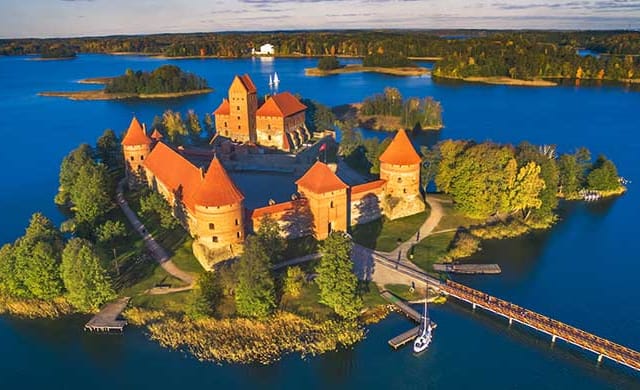Lithuania, land of legends and wild nature
4.8/5343 reviews
Discover the hidden treasures of Lithuania.
A country where history and nature meet.
Must-see locations
Dive into Lithuania: A Journey Between Tradition and Modernity
Like its close cousins, Latvia and Estonia, Lithuania regained its independence only in 1990 after half a century of Soviet occupation. A people with a millennial culture, Lithuanians have often had to deal with invaders throughout their history, whether from Poland, Germany, or Russia, before joining the European Union in 2004 and the eurozone in 2015. Multiple artistic and architectural influences are notably found in the historic center of the capital Vilnius, classified as a UNESCO World Heritage site, or in Kaunas, the country's second-largest city, with its 60 museums and galleries.
But visiting Lithuania, whether as a couple or with friends, by rental car for a self-tour or on an escorted tour, also means discovering a flat country dotted with forests, lakes, and rivers like the Niemen and the Vilnia, not to mention the five natural jewels that form the national parks of Curonian Spit, Dzūkija, Žemaitija, Trakai, and Aukštaitija. A trip to Lithuania should not overlook the many seaside resorts on the Baltic coast and their splendid white sand beaches like those in Palanga.
A Hidden Treasure of the Baltic States to Explore
Welcome to the largest and most populous of the three Baltic States. A tailor-made trip to Lithuania will take you to discover unspoiled nature, far from mass tourism, and a country with inexhaustible historical and cultural resources.

Treasures to Discover in Lithuania
Vilnius, spared by both World Wars, offers a historical center entirely classified as a UNESCO World Heritage site. This architectural treasure includes remarkable monuments such as the Gediminas Tower, Saint Stanislaus Cathedral, and Saint Anne's Church, surrounded by houses with colorful facades typical of Northern Europe.
Kaunas, founded over a thousand years ago, attracts lovers of ancient and modern architecture with its numerous fortified towers, baroque town hall, and the famous Devil's Museum.
The legendary Trakai Castle, located west of Vilnius on a picturesque island, is the former residence of the grand dukes of Lithuania. It is an ideal destination for an excursion in a charming setting.

Unusual discoveries in Lithuania
Unusual Discoveries in Lithuania
The Crosses of the Hill of Siauliai
Lithuania is sometimes nicknamed "the land of crosses." Since its conversion to Christianity in the 14th century, its territory is filled with them. The most emblematic site is located in the north, near the town of Siauliai, on a hill bristling with dozens of wooden and iron crosses. It is an incredible place of pilgrimage.
The Wild Bison of Aukstaitija Park
The bison is a very present animal in Lithuanian mythology and culture. Decimated at the beginning of the 20th century, the wild bison was reintroduced in the splendid Aukstaitija National Park, in the east of the country, near the border with Belarus.
The Curonian Spit
To the west of the country, bathing in the Baltic Sea, unfolds on the Neringa peninsula the long sandy lagoon of Curonia, straddling Lithuania and the Russian enclave of Kaliningrad. A stunning landscape of high dunes that almost recalls the Sahara Desert!
A Living Museum of Medieval Europe
Evangelized, whether willingly or by force, late and superficially, the Lithuanians resisted in their own way to Christianization. Through passive resistance, the integration of Christian myths into the fundamental Indo-European belief up to syncretism, a diversion of worship modalities, all means were used to preserve their pre-Christian heritage to this day. This allows for the discovery of traditions, customs, and forms of worship that, although they may seem strange, are not truly foreign: they share the same Indo-European roots as those that existed in Western Europe before its evangelization. By primarily attacking the Christian religion and blocking most archaeological attempts likely to reveal a past other than that of homo sovieticus, the Soviet regime had the unexpected effect of preserving a cultural and historical background that has not been overexploited or distorted.
An Exceptional Quality of Life
It is mainly due to the numerous activities and cultural events organized in the major cities, but also to the fact that nature holds a privileged place in the hearts of Lithuanians. This has allowed nature to flourish even in the center of their cities. The capital is full of parks, greenery, and is also bordered by forest.
Moreover, Lithuanians are known for their love of calm and slowness. Walking through the center of Vilnius, one does not feel the stress of a metropolis. The same goes for daily security: a young woman can walk through Vilnius at night without any particular risk. Any minor incident is widely commented on due to its rarity, making headlines in the newspapers.
Facilitating Communication in Lithuania
It is entirely possible in English, Russian, or German. The small size of the country, promoting rapid adaptation and change, allows citizens to learn foreign languages with ease. They enthusiastically practice the language of the world's masters. Today, a large majority of individuals speak English. They do not neglect those of their powerful German and Russian neighbors and abandon without hesitation the language of Molière, which was once the primary language in Lithuania.
However, European integration has given new strength to the teaching of Latin languages (French, Italian, and Spanish), and the natural ease of Lithuanians with languages does the rest. Try speaking French in trendy cafes that employ young students, and you might be pleasantly surprised.
A website by
Customize your trips with Quotatrip and receive tailor-made offers directly in your inbox.
Discover a country